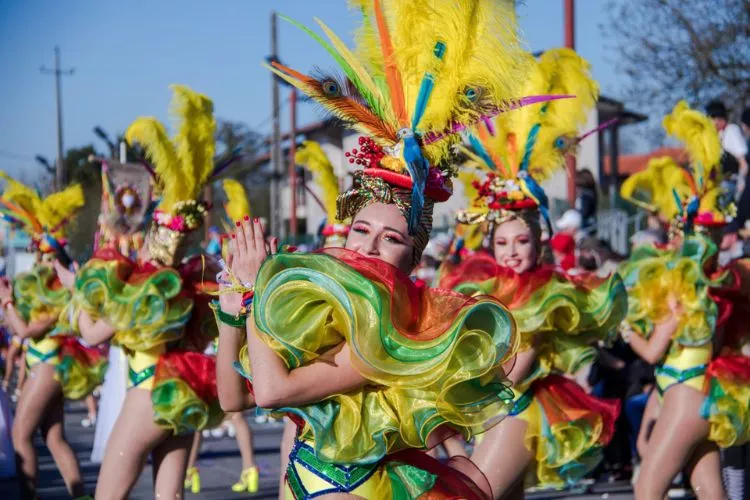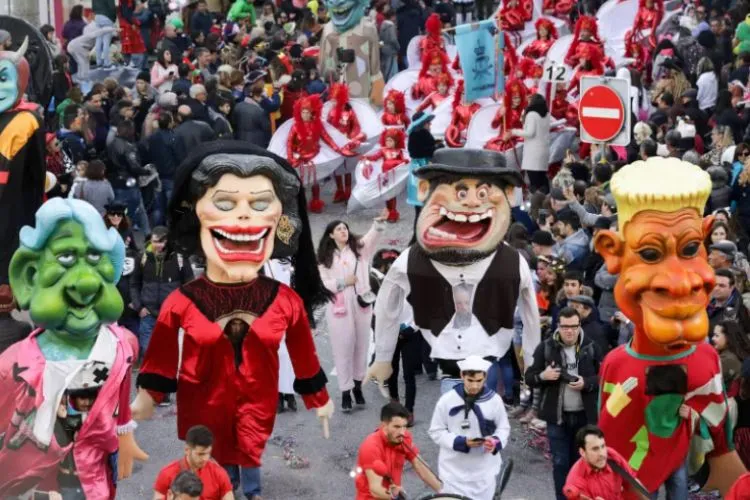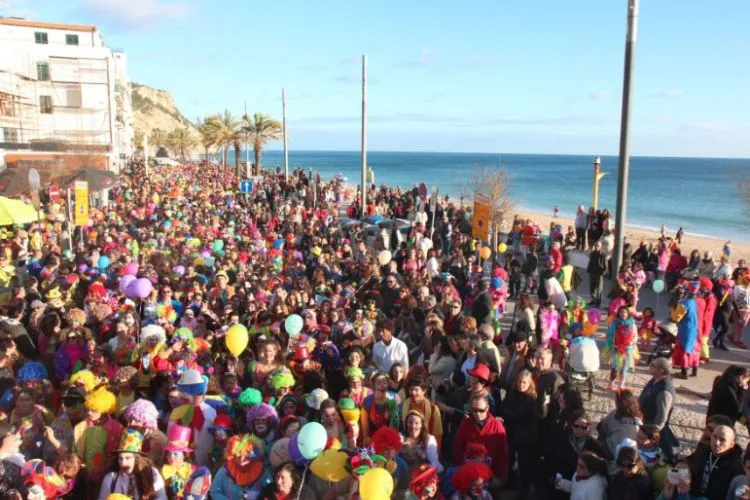24 de January, 2024

Although it is a festival widely associated with Brazil, carnival was born in Europe and was transmitted to Brazilians still at the time of colonization. Over 500 years, it has transformed in both countries, preserving some similarities. Today the Portuguese festival attracts many European tourists and is quite traditional in some cities around the country. In this article we tell you how´s carnival in Portugal, where to go at this time of the year, and what festivities are planned for 2024*.

Carnival is a traditional and ancient festival in Portugal, where it is still called Entrudo, as the ancient traditions of celebrating the arrival of spring in the northern hemisphere were known. Entrudo” (which means “entrance”) referred to celebrations of the religious calendar and was always marked by the spontaneity of the people, who would go out into the streets throwing water and eggs at each other.
Today the Portuguese party has parades of floats, samba dancers, costumed people, men in costumes, masked balls, music, and lots of partying, from north to south of the country. Sound familiar? Yes, in many aspects, the parties in Portugal and Brazil may be similar. But there are also many differences, starting with the climate and dimension of the celebrations, which is more modest.
Realizing your goal of living in Europe or obtaining European citizenship can be simpler than you think. We offer personalized support to make the immigration process more accessible and uncomplicated.
Carnival Tuesday is not considered in the current Portuguese Labor Code (Law 7/2009, February 12) as a mandatory holiday. Unlike what happens in many Brazilian cities, where there is suspension of activities in schools and companies, in Portugal this routine is not altered. Because of this, parties usually take place at night and are more common on the weekend before Holy Wednesday.
In the northern hemisphere Carnaval takes place before the beginning of spring, so it is cold, even in the south of the country. The temperature is usually between 5 and 15 degrees. Even so, don’t be alarmed if you find scantily clad samba dancers dancing in the parades…
In 2024, Carnival Tuesday falls on February 13.
The specific date of Carnival is a moving date, determined by the liturgical calendar of the Catholic Church. It is celebrated in the week before Lent, which is the week before Easter.
Portugal’s carnival celebrations, however, usually take place in the days leading up to Carnival Tuesday, especially on so-called Fat Sunday.
Yes, there are many Brazilian style carnival parties that take place in Portugal, especially in cities with large communities of Brazilians, such as Lisbon and Porto. These parties usually include rhythms such as samba, frevo, and axé. With the growth of this population (today there are about 750 thousand immigrants from Brazil), the offer of events of this type is also increasing.
More and more Brazilian artists are coming to Portugal to perform shows, not only to relieve the homesickness of the immigrants, but also because Brazilian music is quite appreciated in Portugal. In the case of carnival artists, such as “axé music” stars and famous samba singers, the shows usually take place throughout the year, just like in the “Brazilian micaretas”.
In 2023, for example, many famous Bahian music stars performed in the country. They were in Portugal: Ivete Sangalo, Saulo, Leo Santana. There were also shows by Zeca Pagodinho, Thiaguinho, among others.
Incredibly enough, it does exist, although its use is not very common. It is curiously called a mobile stage, and is used in some festivals, such as those in Sesimbra and Ovar. It is also used in other events (white nights, religious events, sports celebrations).
Realizing your goal of living in Europe or obtaining European citizenship can be simpler than you think. We offer personalized support to make the immigration process more accessible and uncomplicated.
During the carnival season, there are parties in several Portuguese cities and regions, each with its own tradition. We list just a few of them below:
Ovar, in the District of Aveiro, has one of the most famous street carnivals in the country, attracting thousands of visitors to the city every year. It is the event with the greatest social, economic and cultural impact in the region. This celebration is famous for its parade of samba schools and floats, created by local carnival groups and decorated with creative and colorful themes. The parades take place during the weekend before Carnaval, when the city streets are closed for the party. The king and queen of the carnival are starred by citizens of the municipality.
The parades in Ovar have been going on since 1952. In that year, 8 floats took the streets of Ovar. Nowadays there are 24!
In 2024, the party will run from January 20 to February 13 and the attractions have already been announced on the website created by the Ovar City Hall especially for the festival. See here the video with the program.
This year’s highlights of the party include the samba school parade on February 2nd and concerts by Quim Barreiros (on February 8th) and Wet Bed Gang (on February 11th). There are also attractions featuring hip hop, electronic music, children’s parties, forró, and much more.

The small town of Macedo de Cavaleiros located in Trás os Montes, is home to an ancient Portuguese festival, classified as Intangible Cultural Heritage of Humanity by UNESCO.
The Carnaval of Podence is marked by the image of Caretos, masked boys in costumes with colorful bangs (red, yellow, and green), pointed-nosed faces, and rattles around their waists. This unusual instrument is what gives sound to the entrudo chacoalheiro (rattle-drumming), which runs through the streets of Podence with much noise and irreverence on Fat Sunday and Carnival Tuesday. Wearing masks and protected by anonymity, the boys of the village embody these mysterious characters and run around the village shouting and jumping, disturbing the tranquility and searching for girls to dance and to “rattle” them. The caretos are originally associated with the figure of the “devil on the loose”, with the excesses allowed at this time of year.
Another highlight of the Podence Carnival are the pretend marriages, on Fat Sunday. This is a moment of humor and without the right to complain on the part of those chosen.
There are also gastronomic evenings, parades of matrafonas (men dressed as women) and a masquerade night. On Carnival Tuesday, there is the Queima do Entrudo parade and ceremony, which announces the end of the party.
Check out the complete program for the Podence Carnival here.

In 2023 to 2024, the centennial of the Carnaval de Torres Vedras which is considered the most Portuguese Carnival in Portugal. In fact, the year 1923 marked the beginning of the tradition of the Carnival King of Torres Vedras, since the carnival manifestations are secular. The celebrations continue into 2024…
The Carnaval of Torres Vedras is one of those that remains faithful to the traditions of the Entrudo celebration. It usually lasts 6 days and counts on the spontaneous participation of thousands of citizens.
Also present at this festival are the floats, which are built by talented local artists. They begin to be made in the summer and take months to complete. They carry messages of social-political satire.
Other important figures of the Carnaval of Torres Vedras are the matrafonas, the cabeçudos and the Zés Pereiras. These are elements that integrate the local cultural heritage and were incorporated by Brazilian carnival celebrations.
The matrafonas or marafonas are men who dress up as women in a cartoonish and hilarious way, playing with women and imitating the female way of acting.
The Zés Pereiras are a group of musicians who play drums, bagpipes and other instruments and parade, sometimes accompanied by gigantones and cabeçudos. Recently the concertina, an instrument of great expression in Minho, has been introduced in these groups.
The gigantones and cabeçudos, which have been present in the Portuguese carnival since 1935, resemble the giant puppets of Olinda in the Brazilian carnival. The gigantones, as the name suggests, are bigger and taller. The cabeçudos have giant heads highlighted on a small body. They began by being made out of paper pulp, but today they are made out of various materials: fabric, plaster, styrofoam, among others.

The City of Sesimbrain Setubal offers a carnival party in February and another one in summer. Yes, that’s right! Everything happens by the sea, in a parade of about one kilometer. Brazilian music sets the tone in both parties.
In February there are samba school parades, masquerade balls, and costume contests. Highlights include the traditional Cegadasthe Cavalhadas de Alfarim and the Paradeparade.
The Cegadas are a centuries-old custom typical of the countryside. They are composed exclusively of men, sung in verse with texts in the style of the old songs of mockery and cursing and accompanied by Portuguese guitars.
The Cavalhadas is another cultural manifestation, where the inhabitants, on horseback, bicycle or motorcycle, demonstrate their skills, recreating the medieval tournaments and showing off their courage to the public.
However, what draws the most attention is the popular Clown Parade considered one of the largest in the world, with more than 4 thousand members and many colorful balloons! The avenue is covered with joy on the Monday before carnival.
Six samba schools and two axé groups also participate, performing on Sunday and Tuesday afternoons. Another classic of the Sesimbra festival is the Burial of the Codfish, on Ash Wednesday, which even has a widow crying her death!
Check out the full schedule of the 2024 celebration here.
In the Algarve region, one of the cities that stands out in the celebration of carnival is Loulé. In 2024 will be five days of celebration in the famous Avenida José da Costa Mealha: February 9, 10, 11, 12 and 13.
The parade will have 14 floats, 9 animation groups, 3 samba schools, gigantones and cabeçudos, and more than 600 entertainers. Political, social and sports satire will once again be present in the parade.
To learn more about Loulé’s carnival program, click here.
Besides these, there are parties in many other cities. Among them: Funchal and Santa Cruz (Madeira), Nazaré, Viana do Castelo, Sines, Alcobaça, Estarreja, Vale de Ílhavo, Famalicão, in addition to Lisbon and Porto.
Driven by the increasing Brazilian presence in Portugal, the schedule of Carnival balls and blocos in Lisbon is only growing. From maracatu to traditional marchinhas, samba, funk and axé, there are attractions for all tastes in the Portuguese capital. (in updating)
Parade of Chapitô: The Chapitô Circus School Carnival Parade has already lasted for 10 years. In 2023, the parade will be inspired by the times we live in today, and promises lots of fun, music, and circus for laughs. Tickets are usually free for Lisbon residents.
Bloco de carnaval Baque Virado: Maracatu in Lisbon? Yes, in the garden of Príncipe Real, towards Cais do Sodré. The procession of the Baque do Tejo group is marked by the spirit of Pernambuco, on the 19th, Sunday. See the schedule for 2024:
Baile do Viva o Samba Lisboa: (coming soon)
Colombina Clandestina Block:The group is a non-profit collective that believes in the collective construction of Lisbon Carnival. In 2024, the largest street block carnival outside Brazil brings the theme #The Color is Pink,” a manifestation of love, diversity, and freedom. This year, they organize the so-called “warm-up” and “hangover” of the carnival. In other words, parties that take place before and after Carnival Tuesday:
Lisbloco: This carnival block follows Brazilian patterns and is formed by musicians and dancers residing in Lisbon, adopting an environmental awareness theme. Its sound encompasses different rhythms such as Samba, Marchinhas, Samba-reggae, Xote, Frevo, among others, and throughout the year, they promote music workshops. In 2024, the carnival theme is “O Brasil que habita Lisboa” (The Brazil that inhabits Lisbon).
Carnival Bué Tolo: The name was inspired by the famous Rio de Janeiro carnival block, Boi Tolo. The percussion section is led by Master Leonardo Mesquita, one of the creators of Empolga às 9 in Rio de Janeiro. It takes place at Cobaia Bar in Alvalade, from 10 pm to 2 am. There’s a lot of samba, funk, and axé.
In addition to the pre-carnival rehearsal, they also usually organize a procession through the streets of Cais do Sodré on the Saturday preceding Carnival. This procession is only confirmed on the eve of Carnival.

Portugal’s second largest city, Porto, also celebrates Carnival with street parades and parties.
Bloco Tá Fixe – The third edition of this celebration will take place on February 3rd, Saturday, at 9 p.m. Following the Brazilian event style, the entry to the party is a T-shirt (abadá). It will also have a VIP area, food court, and live coverage. It will be held at 302 António Carneiro Street (in the heart of Porto). The line-up includes: Retrô eu gosto (Pagode), Focuz (DJ), Thiago Didier (Axé), and a surprise performance.
Bloco Carnavrau Porto – This year, Carnavrau will be at Restaurante Brasileirão on February 11th, at 5 p.m. A parade through the streets of Porto is scheduled to precede the ball on the same day, 11/02, starting at 3 p.m., beginning at Centro Comercial Stop, on Rua do Heroísmo 333, with music and costumed revelers. “Everyone can dress up as they want and if they want; democracy is total. The theme this year will be the European Football Championship, with the slogan ‘There’s Batucada in Carnival. In the European, we are all Portugal.’ With confetti, streamers, masks, freely enjoying the purest street carnival, where popular joy is the priority, and the people are the main artists.
Some of the city’s best dance floors are also part of the party. Be sure to check out the programming of spaces like Pérola Negra, Plano B, Lust, Gare or Maus Hábitos.
*Information may be updated as new events are released. To publicize your party, please contact Atlantic Bridge here.

Author:
Atlantic Bridge